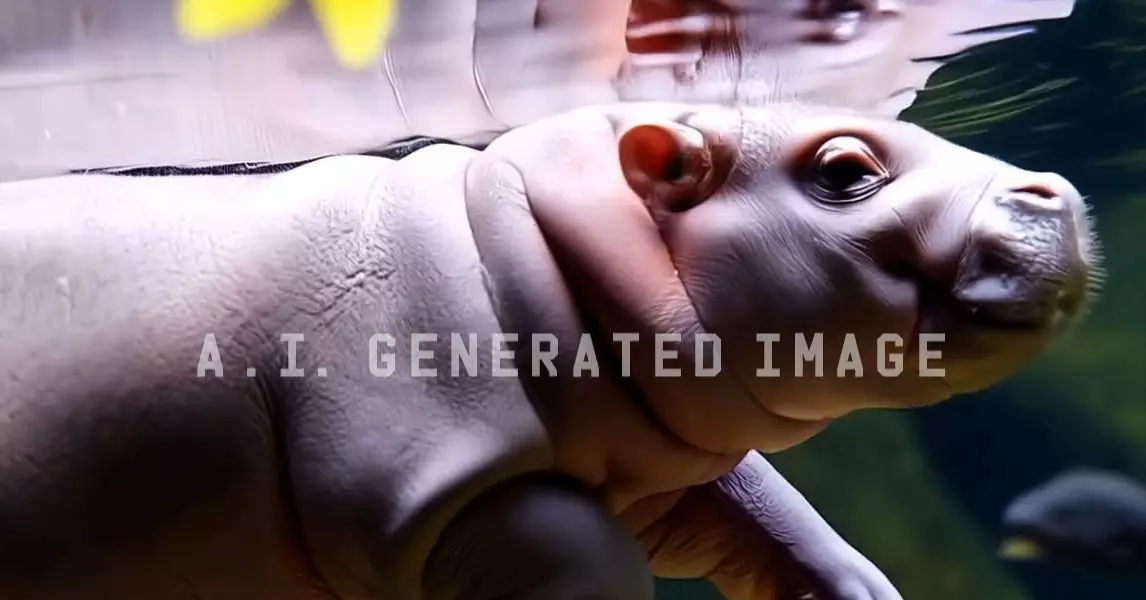In a bold move that underlines the looming influence of artificial intelligence in the media landscape, Meta has introduced a cutting-edge AI model named Movie Gen. This advanced model is geared towards generating realistic audiovisual clips, showcasing its potential for creativity and entertainment. With brief demonstrations featuring whimsical elements, such as a baby hippo frolicking in water, Meta aims to reclaim the narrative around AI’s role in content creation.
Meta’s Movie Gen marks a pivotal development in AI technology, particularly within the realm of video production. Unlike simple text-to-video transitions, this innovative model allows users to edit existing clips, providing features such as the addition of objects and altering physical appearances. For instance, viewers marveled as a woman donned steampunk binoculars in a clip—an example that illustrates Movie Gen’s editing capabilities that meld reality with imagination.
What’s particularly exciting is the model’s provision for generating audio alongside video content. The harmonious coupling of sound with visuals enhances the immersive experience, as seen in sample clips where ambient noises complement the visuals, such as a serene waterfall or the rev of a sports car engine. By integrating these auditory elements, Movie Gen not only generates images but crafts a multi-sensory experience that could redefine video content.
Meta has disclosed that Movie Gen comprises a staggering 30 billion parameters for video processing and 13 billion for audio generation. When contextualized against prevailing models—like the more expansive Llama 3.1, which boasts an impressive 405 billion parameters—the parameter count of Movie Gen showcases its robust architecture tailored for specific multimedia outputs. This kind of technical prowess positions Movie Gen to arguably surpass its competitors in terms of video quality and authenticity, a claim Meta stands firmly behind.
Moreover, the model has the capacity to produce high-definition videos up to 16 seconds in duration. This length may appear modest, but it is significant enough for creating impactful snippets that can be utilized on social media platforms or other digital-first environments. As creators increasingly gravitate towards short-form content, Movie Gen’s specifications align with current digital consumption trends.
However, this excitement is tempered by a pertinent concern regarding the ethical use of data. As highlighted in Meta’s announcement, the exact datasets employed to train Movie Gen remain undisclosed, raising questions about data sourcing practices. The acknowledgment that the model draws upon a mix of licensed and publicly accessible datasets does little to appease the broader conversation about generative AI’s dependability and ethical implications.
The opacity surrounding the training data is emblematic of a larger issue within the industry: transparency. As more companies venture into the realm of generative AI, the necessity for clarity about the datasets and methodologies used will become paramount. Without understanding the foundational data, the generative outputs—including biases or misinformation—remain a contentious topic.
While the announcement of Movie Gen creates palpable excitement, its public availability is shrouded in uncertainty. Meta has hinted at a “potential future release,” but the lack of specific timelines places developers and creators in a state of anticipation. Comparatively, other prominent tech giants, like OpenAI with its Sora model and Google with Veo for YouTube, are in similar positions, opting for cautious rollouts rather than immediate public access.
Nevertheless, Meta’s history suggests that Movie Gen could see integration into its existing platforms—Facebook, Instagram, and WhatsApp—eventually. Such incorporation may pave the way for a new wave of creative tools, enabling users to experiment with AI-assisted content generation directly within these social ecosystems.
For those eager to dive into AI video creation right now, smaller startups like Runway and Pika are already paving the way. These platforms offer users the chance to engage with AI-generated video content, a pleasant contrast to the waiting game surrounding major tech company releases. The juxtaposition between the bold endeavors of these startups and Meta’s path forward highlights the divergent strategies within the tech landscape.
As we witness this convergence of AI and media, the implications for content creators, influence on storytelling, and the broader entertainment industry will be profound. Ultimately, as models like Movie Gen evolve, they will undoubtedly reshape how we engage with, create, and enjoy digital media in the near future.


Leave a Reply
You must be logged in to post a comment.